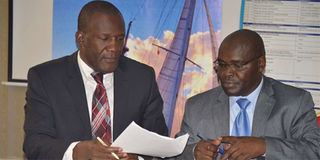Kisumu politicians can now erect billboards, posters

LREB head of secretariat Abala Wanga (left) and Lake Basin Development Authority acting MD Evans Atera exchange documents during signing of a partnership in Kisumu on Tuesday. file | ondari ogega
The Kisumu County government has lifted a ban on erecting billboards and campaign posters in the city centre, a few days after curtains closed on the AfriCities Summit on Saturday.
But there is a rider: politicians cannot paste posters in the city centre or the newly refurbished roundabouts jointly built by the county government and private firms.
Governor Anyang Nyong'o's administration imposed the ban to eliminate litter ahead of the continental event.
One of the resolutions made on February 21 during the Kisumu County ODM delegates conference at Tom Mboya Labour College was to ban posters and billboards.
Participants felt politicians were erecting their campaign posters at crucial locations that they said should be used to market the lakeside city and welcome guests ahead of the international conference that took place from May 17-21.
The ban expires on Wednesday, May 25.
Though the ban has been lifted, the caveat that some locations are off limits for such advertising may hinder many politicians from getting the visibility they want ahead of the August 9 General Election.
Mr Abala Wanga, the acting city manager, said politicians should be at the forefront in keeping the city tidy.
"We understand that campaigns are here with us but we cannot have politicians putting up posters all over town, especially on the newly refurbished roundabouts and Oginga Odinga Street. We have to maintain cleanliness and order in our city," said Mr Wanga.
Aspirants disappointed
But this has not gone down well with some aspirants.
Posters and billboards help aspirants maintain their visibility to voters, so the partial lifting of the ban has elicited grumbling from various quarters, with some calling it unfair.
Some have said the decision infringes the rights of others, especially first-time candidates keen to get more exposure, with some claiming this favours incumbents like the governor.
Dr Rose Kisia, who is contesting the Kisumu woman representative seat, felt the decision was wrong.
"We have always known that after campaigns, we remove the posters, so I don't see any reason why we should be stopped from placing them", Dr Kisia said.
But she said the ban was partial from the start because she could see posters in some parts of the city centre.
Mr Shedrack Okindo, eyeing the Kisumu governor’s seat as an independent candidate, also disagrees with the county government.
He said the governor should not gag candidates who want to market themselves.
"AfriCities is gone and now is the time for us as new promising leaders to introduce ourselves to voters so that they know the kind of individuals they are going to elect," said Mr Okindo.
He appealed to IEBC chairman Wafula Chebukati to intervene and take action against the Kisumu County government.
He said the ban will make it difficult for candidates to publicise themselves.
"This is an electoral offence on the part of Governor Nyong'o by extension because it is discriminatory and infringes the rights of his rivals," said Mr Okindo.
If the ban continues, Mr Okindo said, he will rally other candidates to challenge it.
It is not clear whether the county government is ready to lose the revenue it gets from the billboards.
Owners of billboards pay some of their proceeds to the county government.
It costs between Sh100,000 and Sh110,000 per month to advertise on a 12-by-10-metre billboard in Kisumu, said Ben Ogombe, an outdoor advertiser.
Mr Ogombe, director of Red and Yellow Outdoors Ltd, also charges Sh10,000 per month on every street pole or light box.
For digital screens, advertisers charge Sh50,000 per month.





